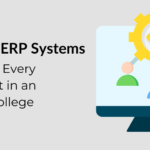Bridging Tradition and Technology: How ERP Systems Support Ayurveda Education
Rajat Shukla
Posted on November 28, 2024

Ayurveda, one of the most ancient and holistic healthcare systems, emphasizes a balance between body, mind, and spirit. This traditional system of medicine has been taught in dedicated colleges across India for centuries. Today, these institutions face the challenge of preserving Ayurveda’s ancient wisdom while incorporating modern technology to meet contemporary educational and administrative demands.
School Management Software and School ERP Software have emerged as transformative tools for Ayurveda colleges, helping them streamline operations, enhance learning outcomes, and sustain their traditional ethos.
Challenges in Ayurveda Colleges
Managing an Ayurveda college is no small feat, given the unique challenges these institutions face:
Complex Administrative Workflows
From handling admissions, fee management, and attendance tracking to organizing timetables and examinations, administrative tasks in Ayurveda colleges are often overwhelming and time-consuming. These manual processes can lead to inefficiencies and errors.Resource Allocation and Management
Ayurveda colleges need to optimize their resources, such as faculty, classrooms, and clinical training facilities. Mismanagement in resource allocation can disrupt academic schedules and student training.Access to Digital Learning Resources
While traditional teaching methods remain central to Ayurveda education, the demand for digital tools like e-libraries and online learning platforms has grown. Integrating these into the curriculum can be challenging without a centralized system.Communication Gaps
Ensuring smooth communication among students, faculty, and administrators is critical. However, traditional methods such as notice boards and manual announcements often fall short in ensuring timely updates and engagement.Regulatory and Accreditation Compliance
Ayurveda colleges must meet stringent accreditation standards, which require meticulous record-keeping and reporting. Maintaining compliance manually can be labor-intensive and error-prone.
How ERP Systems Bridge the Gap
Modern School ERP Software addresses these challenges by offering integrated solutions for managing academic and administrative processes. These systems bring efficiency, transparency, and ease to Ayurveda colleges, allowing them to focus on their primary mission of imparting quality education.
1. Streamlining Administrative Tasks
ERP systems automate repetitive administrative tasks, such as managing admissions, tracking attendance, and handling fee payments. With centralized data management, administrators can ensure accuracy and save valuable time.
2. Improving Student Information Management
An ERP-powered Student Information System maintains a comprehensive database of student details, including academic progress, attendance records, and clinical training performance. Faculty and administrators can access this data in real time, enabling better decision-making.
3. Enhancing Digital Learning Experiences
ERP systems provide a platform for hosting e-libraries, video lectures, and other digital resources. These tools allow students to complement their traditional learning with modern educational resources, ensuring a well-rounded learning experience.
4. Optimizing Resource Utilization
With ERP software, colleges can manage and allocate resources like classrooms, faculty schedules, and lab facilities more effectively. This ensures that students receive uninterrupted training and education.
5. Strengthening Communication
ERP systems facilitate seamless communication through automated notifications, alerts, and messaging platforms. Students, faculty, and staff can stay updated on schedules, announcements, and deadlines without relying on manual systems.
6. Simplifying Accreditation Processes
ERP systems maintain accurate and organized records of student performance, faculty activities, and institutional achievements. These records can be easily compiled into reports required for regulatory compliance and accreditation purposes.
Benefits of ERP for Ayurveda Colleges
By integrating School Management Software and School ERP Software, Ayurveda colleges can unlock several benefits:
- Increased Efficiency: Automation of routine tasks reduces workload and minimizes errors, allowing staff to focus on enhancing student experiences.
- Enhanced Learning Outcomes: Digital tools and better resource management ensure students have access to high-quality education and training.
- Preservation of Tradition: ERP systems can digitize and archive ancient texts, class notes, and research, ensuring the preservation of Ayurveda’s rich heritage for future generations.
- Scalability and Flexibility: ERP systems can easily adapt to accommodate the growth of the institution, whether in terms of student numbers, faculty, or additional campuses.
- Data-Driven Insights: Analytics provided by ERP software offer actionable insights into student performance and institutional operations, enabling informed decisions.
The Future of Ayurveda Education with ERP
In an increasingly digital world, Ayurveda colleges must evolve to meet the expectations of modern students and regulatory bodies. While tradition remains the cornerstone of Ayurveda education, technology offers the tools to enhance its accessibility, efficiency, and impact.
By adopting School Management Software and School ERP Software, Ayurveda colleges can ensure they remain relevant and competitive while continuing to honor their ancient roots. These systems empower institutions to deliver better educational experiences, streamline their operations, and prepare students for a future that balances tradition with modernity.
ERP systems are not just technological upgrades—they represent a commitment to excellence in education, administration, and the holistic well-being of the entire academic community. As Ayurveda continues to gain global recognition, colleges equipped with modern tools will be better positioned to lead this resurgence, ensuring that ancient wisdom finds its rightful place in the modern world.



